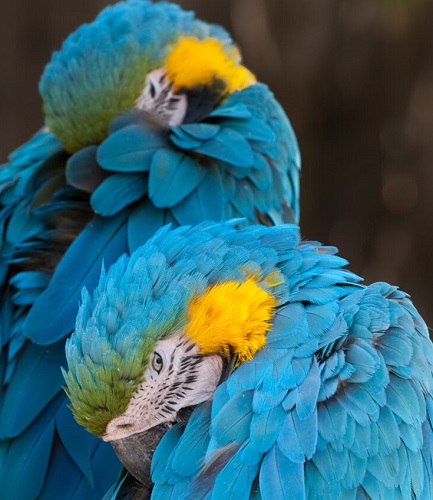Is Your Parrot Getting Enough Sleep?
Posted by Is your Parrot getting enough sleep, how much sleep do Parrots need, Parrots and sleep, how to tell if your Parrot is getting enough sleep on 2/4/2025
Here?s how to tell if your Parrot is getting enough sleep...
As we all know, an important component of health is getting enough sleep at night. We have all read about the serious long-term problems that can arise when people don?t get sufficient rest, and the same is true of our Parrots.
Species
We also need to keep in mind that individual needs vary. My husband and I are (supposedly) the same species, but he needs eight hours of sleep a night, and I only need six.
Variations exist with Parrots as well, both between individuals and between species.
Most of the companion species of Parrots come from close to the equator. This is important to realize, as the closer we get to the equator, the closer we get to an even split of twelve hours of darkness and light. At the equator, day lengths do not vary as they do in the temperate zones of Europe and the US.
Equatorial species include the Indonesian birds like Moluccan, Goffin?s and Umbrella Cockatoos, as well as many of the African and South American species. It is therefore logical to conclude that equatorial species need more sleep in captivity.
Australian
Other species like Budgerigars and Cockatiels (who inhabit most of the Australian continent) are likely more temperate creatures, as their day lengths vary more like ours do. Therefore, they perhaps need less sleep at night.
All this matters because sleep deprivation can lead to behaviour problems as well as some physical problems, just as they can with humans. I know that I tend to bite and scream if I have not had enough sleep, and the same is true of many Parrots!
The first thing to establish is how much sleep your Parrot is getting now. I used to ask owners what time they put their birds to bed at night, but learned from experience that this did not give me the information that I needed. It makes sense to me that a small prey animal like a Parrot is unlikely to sleep deeply if there is a predator moving around close to its enclosure.
Tree
After all, it makes no sense that a Parrot would sleep deeply if there was a jaguar in its tree. So it occurred to me that what was most important when evaluating the amount of sleep a Parrot gets had to do with humans (large predators) moving around in the room.
Consequently, I now ask what time the last human leaves the room in which a Parrot spends the night; then I ask what time the first person gets up in the morning. So if you cover your bird?s cage at 8 PM and uncover it at 8 AM, you might assume the bird is getting 12 hours of sleep.
However, I doubt that is actually the case if your teenage son is watching horror movies in the same room until 2 AM, and your husband gets up at 6 AM to go to work. In that case, the bird is actually getting only 4 hours of uninterrupted sleep.
Rather than demanding that your son turn off the TV at 8 PM (which would likely cause some family problems!), U.S. veterinary behaviourist Andrew Luescher came up with a better idea, which he calls a ?sleep cage.? A sleep cage is a small cage (like a boarding cage or carrying cage, for instance) that is placed in a room that is unoccupied by humans at night.
Closet
Perhaps this might be the downstairs bathroom, or even a large, well-ventilated walk-in closet. When it is time for your Parrot to go to bed, you put it to bed in that small cage, just like you put children to bed at an early hour when they were little.
In my opinion, the most important component of a Parrot?s good night?s sleep is the absence of predators like humans. I do not think the room has to be totally dark, as we all know about small birds like Cockatiels that are prone to night flights, and do better when there is a nightlight in their sleeping area.
Find the perfect cage for your Parrot here.
In addition, I gather the jungle is far from quiet at night, so the family needn?t tiptoe about the place, either. They should just avoid going into the Parrot?s sleeping room after bedtime.
So how much sleep does a Parrot need?
We really don?t know, and there is no science I know of regarding this. However, depending on species as well as individual, anywhere from 8 to 10 to even 12 hours seems to work nicely.
How can you judge if your Parrot is suffering from too little sleep?
That is much easier to figure out. If your bird shows behaviour problems such as feather destruction (what we used to call ?feather plucking?), excessive screaming, aggression, and even excessive fear, sleep deprivation might play a role.
So if you make an effort to allow your bird 10-12 hours of uninterrupted sleep for two weeks straight, you are likely to have a better idea about this. If the Parrot?s behaviour problems decrease, then a lack of sleep likely plays a part in the situation. If there is no change in the bird?s behaviour, then sleep is likely not an issue.
By the way, if you have a fabulous companion bird that gets little uninterrupted sleep but seems to have no physical or behavioural problems, then you needn?t worry about it. As they say, ?If it isn?t broken, don?t try to fix it!?


